A Classic Wild Coast Paddle
While most SA paddlers were either resting their tired limbs after an exhausting Cape Point Challenge or catching waves at their favourite holiday beach, six intrepid paddlers from Durban decided to dodge the crowds and head for the Transkei Wild Coast. The plan: to paddle 27 kilometres of the Pondoland Marine Reserve between Port Edward and Mkambati Nature Reserve, to camp overnight at Mtentu River Camp and return by ski or horse, depending on the winds of the following day. Our seconds would undertake a 2 and a half hour drive from Port Edward on potholed unnamed tracks to the overnight rendezvous with the navigational assistance of a Pondo guide.
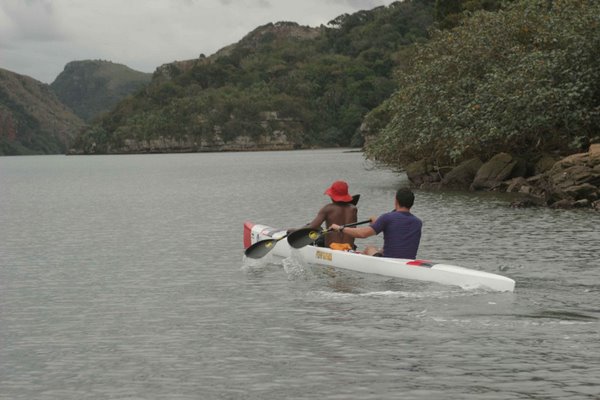
The Wild Coast conjures up images of shipwrecks, untouched beaches, dramatic landscapes and colourful Xhosa villages. For the paddler, the Wild Coast is mysterious; a forbidden ocean with rough surf, perilous currents and man-eating Zambezis. But the reality is somewhat less dire. For those in the know, the Wild Coast can offer enough placid and soul-lifting paddling experiences to match the extreme opportunities that abound.
We had selected one of the most classic stretches to paddle for a number of reasons. Firstly, the launch area is extremely accessible; being located only 180 km or an hour and a half from Durban. Secondly, there are a number of launch options, namely the main beach at Port Edward, the Pont on the Umtamvuna River, or the beach in front of the Wild Coast Sun. Thirdly, at 25 - 30 km the distance is relatively short to enable an honest but leisurely paddle and to lessen the risk of being caught in bad weather. Lastly, this is one of the most unspoilt, uninhabited stretches of beach on the East Coast with a final destination rated as one of South Africa's most beautiful estuaries.
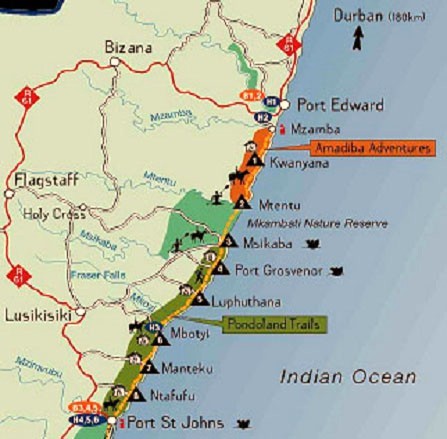
The conditions on the day were superb. We encountered relatively small surf at the early morning launch at Umtamvuna River mouth, although some growlers on the mid-break sandbank rolled one of the ski's. The north-easterly wind had been blowing for much of the night and by the time we got to backline there was a fresh 20 knot tail-wind and fast running seas. The runs on this little-known stretch of coast were lots of fun and some of the double skis reached speeds of up to 28km/hour. The non-stop action made sightseeing difficult but we managed to slow down to marvel at schools of dolphins and landmarks such as Mzamba Fossil Beds, Mnyameni Gorge and the Red Sands (dunes full of Iron Age artefacts).
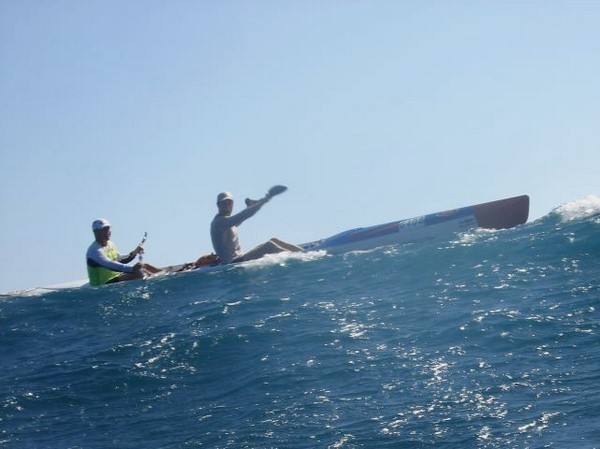
After an hour and forty-five minutes we followed the runs directly into the permanently open Mtentu Estuary, which forms the northern border of Mkambati Nature Reserve. The currents and rocky heads at the estuary mouth require some measure of caution and skill and should not be attempted if one is fearful of capsizing in turbulent and sharky waters.
Mtentu Estuary is a secret paradise, a place one comes to know through whispers of confidentiality from one friend to another. In fact, this disclosure is made only in the interest of community upliftment and biodiversity conservation. The pristine estuary runs through a deeply incised and thickly forested gorge and is at the epicentre of one of the recognised global hotspots of botanical biodiversity. In addition to common sightings of sharks and terrapins cruising the clear estuarine waters, it is also one of the few estuaries in Southern Africa where huge shoals of Giant Kingfish, some over 90cm in length, congregate during the summer months (no fishing is permitted in this legally protected sanctuary).
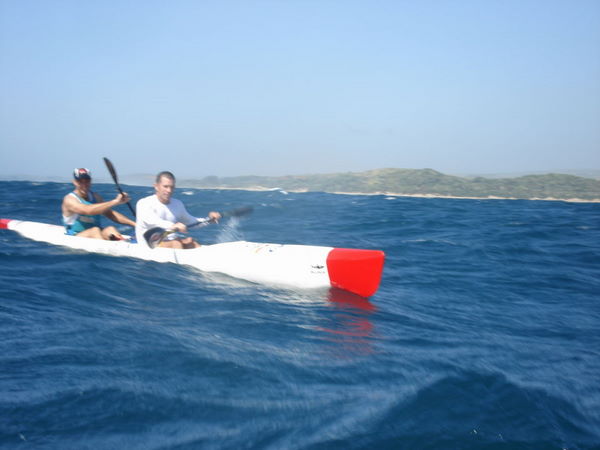
Two comfortable but rustic camps grace the northern bank of the estuary, the first a tented camp on timber stands and the second an assembly of timber and canvas chalets. These camps were the product of a European Union-funded, pro-poor tourism initiative in the area and are now owned and run by local community members. Guests can chose either catered or self-catered stays and the only reason they will need to enter the kitchen is to retrieve a cold beer.
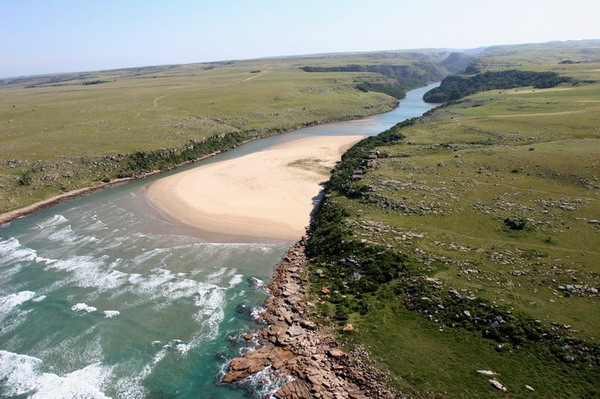
Sadly, this tourism operation has become a casualty of a simmering war between mining companies and nature-based tourism proponents. Environmentalists have argued that "... mining the Pondoland Wild Coast is the moral, cultural and aesthetic equivalent of quarrying Ayers Rock for granite, or the Great Barrier Reef for calcium carbonate."
The conflict has been tearing apart the community for some years as its members are pressured to choose which development path to follow. Investment from tourism's private sector has been stymied due to the uncertain future of the area and the dirty tricks from the mining companies and local power-lords who are on their payroll. While the conflict plays out, the tourism operations slowly decay, playing straight into the hands of the mining lobby.
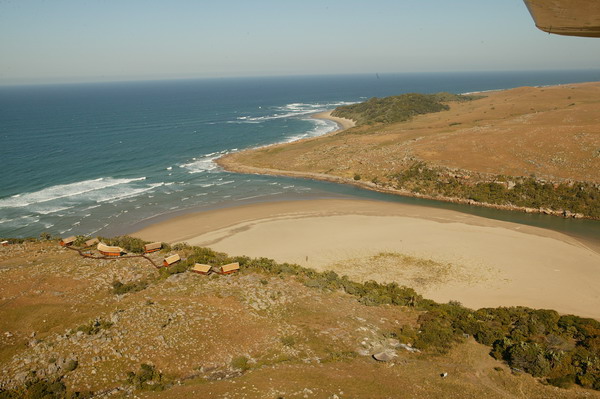
According to the mining proponents, the 25 km stretch of coast that we had paddled has the world's 10th largest titanium deposit, estimated at worth about R11-billion. Ambitious plans have been tabled to establish a massive open cast mine complete with a tailings dam, separation plant and a downstream smelter with a limited project life span of 22 years. Government is currently considering the application. In the meantime, the community have formed the Amadiba Crisis Committee to fight the plans and concerned civil society groups have established the "Save the Wild Coast" campaign.
That night we slipped into our tents and fell asleep to sounds of the waves washing up the beach and animated insects singing for their mates. At approximately 2am we were woken with a gift from the gods; a stiff south westerly whistled through our tent as it began to turn the seas towards home.
The next morning we gratefully declined the community's offer to saddle up on their Pondo ponies and clamoured instead onto our skis for a second helping of adventure, as we set out on our return paddle to the bright lights and overrun beaches of Port Edward.
- Book your horse trail or accommodation at Mtentu Estuary at the Amadiba Adventures Office. Telephone: 039 - 3056455/ 039 - 3056538
- Find out more about the mining threat and how to do something about it from Sustaining the Wild Coast, http://www.swc.org.za

